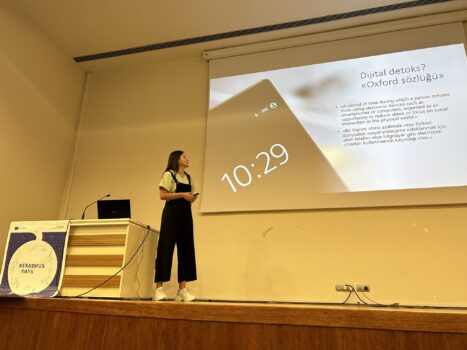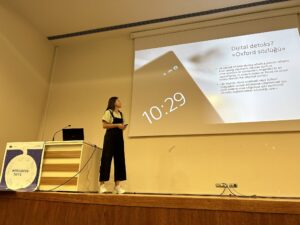I’m Naz Fulya Çibik, a researcher specialising in environmental education at Mugla Sitki Kocman University, in Türkiye. I am delighted to contribute to this project by taking part in Digital Detox Workshop and introducing the Campus Farm.
We started the Campus Farm- the ecological agriculture application area- just before the Covid19 pandemic spread. The aim was to inspire university students and faculty members to be resilient to climate change and its consequences through caring for the environment, working with the soil, and learning about ecological agriculture. At the Campus Farm, we use local seeds that are distinguished from the non-local ones thanks to their endurance. Working with local seeds is vital for contributing sustainable food production. These seeds are adapted to their environment, the climate, water, and soil, and they can be reused many times. he Muğla district, with its red, mineral-rich soil, is optimal for using these local seeds. The Campus Farm is a place where people in our university can get away from the stress of everyday life, especially the ones caused by overexposure to technology by being occupied with the soil and plants. As a result, we believe it (the Campus Farm) is a place where digital detox is possible.
In today’s session I introduced the Campus Farm, its main aims, and how it relates to digital detox. The participants were surprised when I emphasized how special the local seeds were. They had no idea why they were unique and unusual. They were also unaware of the Campus Farm, therefore, with this presentation, in line with the aims of this workshop, the participants were provided with an area to perform digital detox. I also discussed the mental and physical health benefits of digital detox by linking the topic to the term ‘Shinrin Yoku’ (forest bathing). Shinrin Yoku was first introduced by the Japanese Ministry of Forestry in 1982 as a remedy for individual burnout primarily caused by exposure to technology, and to motivate people to maintain the country’s forests. I discussed what happens to a human body after interacting with nature in the first 10-15 minutes, 1 hour, and 3 days. I recommended scientific literature for further reading. After the talk, we walked to the red pine forest near the conference building after the presentation and did a ‘mini’ Shinrin Yoku for 5 minutes.
Everyone wandered around silently for 5 minutes, some touching the ground, soil, and trees. Some of them closed their eyes and concentrated on (I assume) natural sounds. I knew it wasn’t an ideal Shinrin Yoku location with all the people together, but the aim was to introduce them to an experience they could have whenever and wherever they want. As a thank you gift at the end of the program, I gave them local seeds harvested from the Campus Farm. I believe that this session contributed to their motivation to spend time in nature, to plant seeds, and to take a little break from screens on mobile devices or laptops. I was delighted to share my experience with others and help them experience experiencing nature. Many thanks to Eyüp and llker for giving me this opportunity. I’m looking forward to the next ones.
Naz Fulya Çibik
Researcher


